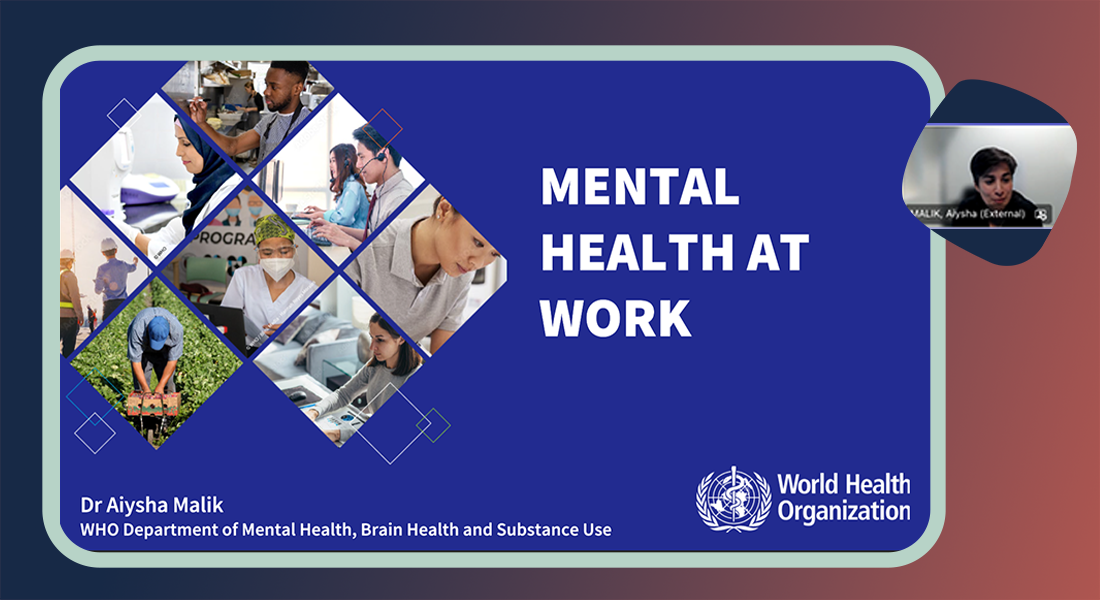Mental health crisis affects one in six working adults, experts warn
On Friday, April 25, the “Mental Health in Times of Change” webinar brought together HR professionals and mental health experts to discuss one of the most pressing challenges facing today’s workforce: mental health in the workplace. Hosted by the Network of Corporate Academies—a professional HR network for public and private organizations in Denmark—the event featured the ADVANCE project, with insights from project coordinator Wietse Tol and World Health Organization collaborator Aiysha Malik.

A central theme of the discussion was the need to rethink how we approach mental health at work—not just as an individual issue, but a systemic one.
“The key innovation in prevention today is that we’re no longer focusing solely on individual skills—we’re also looking at the broader context people live and work in,” said Wietse Tol. “If the workplace is highly stressful, has a toxic culture, and poor work-life balance, simply offering yoga sessions isn’t enough. We need to address the structural issues too.”
The ADVANCE research project is taking that challenge head-on by looking beyond traditional public health approaches.
“In public mental health, this means addressing poverty, gender-based violence, and inequality. We’re working across disciplines and sectors, which isn’t easy. But it is necessary if we want real, sustainable change,” Tol added.
Another key focus of ADVANCE is inclusion and collaboration.
“We’re no longer developing solutions in isolation. We’re working alongside policymakers, practitioners, and those directly affected to design better, more practical interventions,” Tol emphasized.
Aiysha Malik from the WHO underscored the urgency of workplace mental health, pointing out that nearly one in six working-age adults globally lives with a mental health condition.

“This affects not just personal well-being, but also productivity, workplace dynamics, and national economies,” she said. “It’s a critical issue.”
Malik noted that international policies have increasingly spotlighted the workplace as a setting for change.
“Since most adults spend a large part of their day at work, this becomes a powerful environment to make a difference. Good working conditions protect mental health. But toxic conditions—like those discussed earlier in the webinar—can do real harm,” Malik emphasized.
“If a company is going to invest in a workplace program, we want to make sure that investment actually makes a real difference—whether that’s for employees, managers, or the overall workplace culture.
Malik also emphasized that while awareness is growing, there is still much we don’t know.
“We’ve identified a lot of research gaps in this area—there’s still so much we don’t know. That’s why the ADVANCE trial we’re running in the Netherlands, led by Wietse and colleagues at the University of Amsterdam, is so exciting. One of the key issues we noticed is that very few studies combine different types of interventions, like manager training alongside stress management for employees. We’re not seeing much research on the combined impact of these approaches.”
The trial in the Netherlands is now called “MentaalFit” which will test the combination of two of WHO’s mental health interventions: Advancing Supervisor Capabilities for Mental Health at Work (ASCEND) and Doing What Matters Most in Times of Stress (DWM).
“So, it’s really promising that, after identifying these gaps, this trial is now actively exploring them. We hope this work will help fill some of those gaps and set the stage for more comprehensive approaches in the future,” says Malik.
The "Mental Health in Times of Change" webinar was hosted by NOCA as part of the Danish Science Festival organised annually by the Danish Ministry of Higher Education and Science.
 The ADVANCE project has received funding from the EU Horizon Programme under Grant Agreement No. 101080323. Views and opinions expressed are however those of the author(s) only and do not necessarily reflect those of the European Union or the Health and Digital Executive Agency. Neither the European Union nor the granting authority can be held responsible for them.
The ADVANCE project has received funding from the EU Horizon Programme under Grant Agreement No. 101080323. Views and opinions expressed are however those of the author(s) only and do not necessarily reflect those of the European Union or the Health and Digital Executive Agency. Neither the European Union nor the granting authority can be held responsible for them.